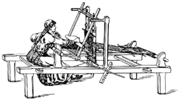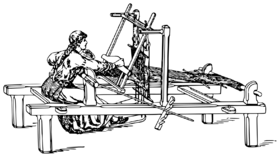SHARINGACTION2019 Collective infrastructures, collective participation, collective fundings 2019/11/20
De teixidora
Quan: 20-novembre-2019 · Hora: 13:15 - 14:15· On: Sharing Cities Stand Lab – Gran Via Venue, HALL 1 · Av. Joan Carles I, 64 08908 L’Hospitalet de Llobregat (mapa) · Llengua: en-anglès Organitza: Ajuntament de Barcelona, Barcelona Activa, Dimmons-UOC
Hashtag:#SharingCitiesAction19_Xarxes socials:
El Sharing Cities Action Encounter és un programa de 3 dies per explorar models alternatius de futur en tres eixos: treball de plataforma, gènere i inclusió i dades procomunes. La trobada té lloc en el context del Smart City Expo World Congress (SCEWC) a la Fira de Barcelona. Aquesta és una de les sessions que formen part del programa.
“… From 19 to 21 November, the Sharing Cities Action Encounter 2019’s three-day programme will work to come up with alternative models for the future, focusing on three main topics: Platform Labour, Inclusion
Documentació d'aquesta sessió
 Apunts i cròniques
Apunts i cròniques
Apunts presos a l'esdeveniment, cròniques, ressenyes i documents de conclusions.
Apunts
Apunts copiats al wiki:
https://pad.femprocomuns.cat/sharingbcn2019collective
Collective infrastructures, collective participation, collective fundings
Sharing Cities Action Encounter Barcelona - 19-21 November 2019
http://www.sharingcitiesaction.net/encounter-2019/programme/
Collaborative notes at Teixidora.net, documentation to share and reuse.
Conference notes
Platoniq (only picked at the end)
we have to bring all these platforms to a third dimension. for example: applying decidim to urban governance, to buildings run by citizens who are designing their own participatory processes, and who could for instance, make visible the work of volunteers who are refurbishing buildings.
Wouter Tebbens
First on the internet of things: several cities started to work on a project, where 800-1000 people participated.
In 2015 we started a group, following the example of amsterdam, so that people could connect their sensors. we're a group of 8 people in the driving team, and several hundreds who participate in the network infrastructure, finding places for guifi.net antennas, putting sensors, sending data via guifi.net. we have a network of 32 antennas active today, 12 pilot program with padriñas, who contribute to set up an antenna in fablab bcn and other orgs so we could extend the network in their neighborhoods.
this year we joined coop femprocomuns, where users and workers come together. we try to consolidate the community network. xarxe oberta of the internet of things. deployment of the network, building capacity, ppl learn technologies and work in temas in shared challenges.
join us in ttn.cat and thethings.org femprocomuns.com
On commonscloud.coop: proprietary platforms eat our data and we wanted to share our resources and gain awareness about what we're doing with technology - a very serious threat, people are losing out their private lives to big corporations.
we co-produce with 6 orgs: jamgo, colectic, femprocomuns, lliure tic, bTactic, free knowledge institute. the users are becoming owners, co-owners, members, socias from the cloud.
the project develops around 4 working groups (development, communication, etc...) and counted on several crowdfunders and a subsidy from Ayuntamiento de BCN. Some entities with a dedicated office.
GAFAM business models eating our right to privacy. the user can choose whether or not to share their data? if you use these platforms you're choosing to share your data.
why commons cloud? 4 foundational principles: open and commons cooperativism (users are co-owners, one user=one account, one vote); privacy and data policy; free software (replicable, auditable, co-developed, co-produced); decentralization (self-management of accounts by collectives, interconnection between clouds).
WHAT we offer? office (ex: contacts, calendars, collaborative documents); project manager platforms (tasks), agora (online forum on discourse, for collective decision making).
individual users have commons cloud account always for free and they can use the community services (agora and projects). become member one time capital deposit of 10€ plus service fees.
collective users: self-management of commons cloud.
"take the leap to free and ethical technology"
Pau from vocdoni.io
"reimagining governance".
different from other solutions related with voting and governance is that we want to make a new kind of voting. digital voting works for small groups who have trust. for instance, doodle, you have to trust it and its administrator. if you have trust in your community, it works. but when there's no trust? a city like bcn or a country like catalonia, how can you be sure that your vote counts?
in estonia, the most advanced country in europe regading vote, you still have to trust the government. our focus on fixing this problem, and how we can do it.
you probably heard about blockchain, a way to get distributed consensus. you can have consensus on if a vote is valid or not. it is distributed, there are no central authorities, everyone plays the same role. we use it but just for small things, minimum, just to have the consensus.
I am part of a list without telling anyone else I am part of it. trust is in mathematics. anyone in the world can check if my vote was valid and in fact counted. this allows a new kind of democracy. my opinion is that democracy works in small groups but not in big groups, that's why we have representative democracy, and this is not real democracy. through blockchain we can have the real democracy.
security for the user, distributed, open and free (source software), anyone can check the code and make modifications; we want to achieve scalability, but that's hard. we want to make it very easy for the end user. we want to make it normal, like people check their twitter and facebook on bus. you can go in the bus and check proposals and vote. we want to make democracy as something we do in our life in everyday and not only every 4 years.
we started this 2 years ago, first years just designing, talking with people and designing prototypes; second year we've been developping and we're very close to have a first release in the comming weeks. it will be an android app. you'll be able to test it, use it, and give feedback. we're looking for beta testers.
guifi.net foundation
15 years ago today and still half of the world is not connected. that motivated us. and also, for not depending on the corporations to have access to the internet and manage it by ourselves.
everybody understands you can make a coffee to yourself, or go to a coffee shop, or go to starbucks.
a few blocks from here there is an interchange of the internet here in bcn. we connect right now more than 100k people on a daily basis
"it's not a miracle, it's something that can be done, and it can be done worldwide to connect the next billion, like an expresso"
telecommunications is a bit more difficult. the other side is to make that network not a private asset but a common good. that's the other dna we have since the beginning. to join a million of small things into one big thing, you have to bing communities together. for that to happen, which is the commons, it is very connected to all the panelists who have sopken before: governance, data, tools, etc. to build infrastructure you need to connect it all.
Question from moderator on the new "real decreto": is it a threat to collective / commons initiatives?
pau: there is no space in europe for this. guifi.net is the only way to survive this censorship.
guifi: it's a joke, (...). it will not survive the common sense in long term. the only explanation is because of the spanish elections. the hope is that in the long term these things will disappear.
wouter: we set up all kinds of virtual networks outside of spanish jurisdiction. but the threat is there because we have this kind of policy makers, and more more ppl is depending on this proprietary platforms. keep some kind of freedom but im not optimistic.
platoniq: i think next year we will be here again and say "decreto es muerto".
 Vídeo
Vídeo
Enregistrament audiovisual de l'esdeveniment o continguts audiovisuals relacionats.
Enregistrament en vídeo de la sessió
el taller ![]()
Col·labora completant o afegint la documentació que falta.
Hi ha: > ![]() apunts o cròniques >
apunts o cròniques > ![]() vídeo
vídeo
No s'ha incorporat documentació de:
-
 Presentacions o material projectat
Presentacions o material projectat -

 Imatges
Imatges
-
 Àudio
Àudio
Teixim connexions
Teixim una xarxa de connexions partint d'aquest esdeveniment'. Extraiem i etiquetem continguts de la documentació generada per explorar relacions amb altres esdeveniments, identificar narratives, elements pel debat i generar cartografia dels actors implicats.
 Metadades
Metadades
Informació estructurada de l'esdeveniment que permet connectar-lo amb altres continguts a Teixidora.
Paraules clau: IoT, internet de les coses, cooperativisme de plataforma, núvol digital cooperatiu, GAFAM, vot, blockchain, consens, distribuït, democràcia escalable, democràcia representativa, xarxa com a bé comú, censura
Mostra paraules clau en altres llengües · anglès ·
Paraules clau en anglès: IoT, internet of things, cooperative platform, cooperative cloud, GAFAM, voting, blockchain, consensus, distributed, scalable democracy, representative democracy, network as common good, censorship
Mostra paraules més freqüents al text
Intervinents: Pau Salas, Adriana Freitas, Olivier Schulbaum, Ramon Roca, Martha Gomez, Wouter Tebbens, Thais Ruiz de Alda
Persones mencionades:
Projectes mencionats: commonscloud.coop, guifi.net, Decidim, The Things Network, Xarxa Oberta i Comunitària d'Internet de les Coses (XOIC), Doodle, Decretazo Digital
Organitzacions mencionades: Platoniq, Jamgo, Colectic, femProcomuns, LliureTIC, bTactic, Free Knowledge Institute, Fundació Guifinet, Vocdoni.io
Llibres i publicacions citades:
 Diagnòstic
Diagnòstic
Diagnòstic i/o avaluació que s'ha fet a l'esdeveniment.
Riscos / debilitats / mancances
Oportunitats / fortaleses
Propostes
el taller ![]()
Col·labora estructurant els resultats a partir de la documentació existent
A més dels resultats mostrats en aquesta pàgina, Teixidora permet mostrar de forma estructurada els següents resultats:
- Cites (què s'ha dit)
- Alternatives
Si creus que d'aquesta sessió se'n poden extreure alguns d'aquests resultats edita la pàgina i posa-ho a les caselles previstes a la secció "resultats".
Lloc
Mapa d'ubicació
Localització: Sharing Cities Stand Lab – Gran Via Venue, HALL 1 · Av. Joan Carles I, 64 08908 L’Hospitalet de Llobregat
el taller 
![]() Afegir a teixidora esdeveniments similars a aquest
Afegir a teixidora esdeveniments similars a aquest
(es copiaran els continguts principals però no el títol ni el buidat)
Afegir esdeveniment que sigui...
![]() amb mateixos organitzadors i lloc
amb mateixos organitzadors i lloc ![]() al mateix lloc
al mateix lloc
![]() Reutilizació de continguts : els continguts de teixidora es poden re-publicar en viu a altres webs.
Reutilizació de continguts : els continguts de teixidora es poden re-publicar en viu a altres webs.
![]() sindicació Atom d'aquesta pàgina
sindicació Atom d'aquesta pàgina
![]() sindicació RSS d'aquesta pàgina
sindicació RSS d'aquesta pàgina
![]() Afegir a un calendari amb iCal
Afegir a un calendari amb iCal




